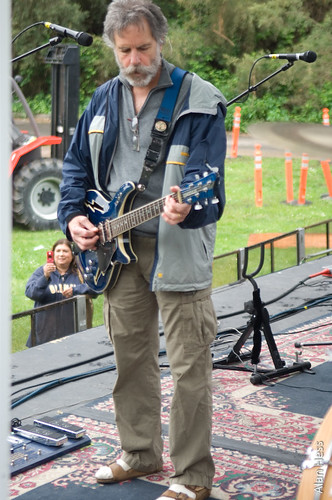News
------------------------------------------------------------------------Skip image
Dan Terk/Collegian
Dennis McNally, authorized biographer of the band Grateful Dead and UMass Amherst almnus speaks of his career during a lecture at Memorial Hall on Wednesday
------------------------------------------------------------------------
Grateful Dead biographer speaks at UMass
By Kathryn Sullivan, Collegian Correspondent
February 11, 2005
By Kathryn Sullivan
Collegian Correspondent
Thirty years after receding from the stark world of academia to pursue a seemingly more exciting avenue of history, Dennis McNally, the authorized biographer of the band The Grateful Dead, returned to the University of Massachusetts to defend his work in a lecture at Memorial Hall on Wednesday.
In front of a room full of deadheads, faculty and students, McNally reflected on his academic roots and his uniquely personal journey to discover history for himself. He graduated from the University of Massachusetts in 1979 with a Ph.D. in American History. He reflects on his education fondly. Worthy and fascinating teachers and long nights buried in books marked his years here.
Yet, he feels that the jargon-filled formal style of history writing he was taught, made it inaccessible to the public. When choosing a subject for his dissertation, McNally took a "sharp left turn" from his predecessors in the field when he became an author.
He comprised a biography of beatnik poet Jack Kerouac, which he published under the title "Desolate Angle." This was met with much criticism by the dissertation board.
McNally went on to write a biography of the Grateful Dead, which he researched while touring with the popular psychedelic band of the 1960s, 70s, and 80s, as their publicist for over twenty years. His very uncommon pursuit of history continues to challenge the established system.
Respect was a concept that lingered heavily in the air of Memorial Hall last night. Delicately constructed statements protected the thick cloud of respect that no one wanted to disrupt. McNally looked hopefully at the history department faculty, from which he originated as he explained the rock-and-roll research-filled years that have defined him as a historian.
Similar to the qualities he admired in Jack Kerouac, McNally seemed to be searching for some sort of redemption and respect from his peers as he simultaneously challenged everything they know about writing history.
McNally punctuated his subject matter with jokes as he discussed the
importance of writing history for the public.
"Writing cannot be exclusively intellectual," he said to the audience. He urged historians to write history like a story in order to "produce more elegantly expressed history".
He reminds history writers to view their subjects as people who "lived, breathed and cried" and not as "puppets for theories."
On the subject of objectivity he said, "fairness is all we can expect."
Although he shared close relationships with the Grateful Dead, he did not let it effect what he wrote about their lives, he said.
"You pursue fairness because you pursue quality," he said.
McNally said that revisiting his roots at UMass has reinvigorated him to work on his next book, a historical look at the culture, music and literature surrounding the Mississippi River.
McNally was pleased to rejoin the academic community, even if only for one night. Upon leaving the podium he remarked, "Thomas Wolffe was wrong, you can go home again."
10 hours ago






